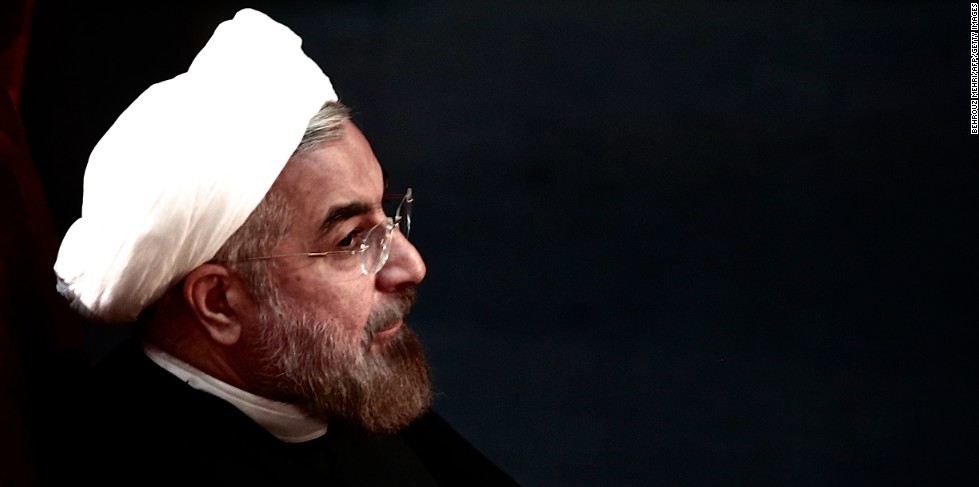PHOTO: President Rouhani faces pressure over his economic policies
LATEST
- Reformists: Corruption Prevent Supreme Leader’s “Resistance Economy”
- Khamenei Calls for Boosted Military, Taunts Government Over Its Foreign Policy
Iran’s President Rouhani unexpectedly cancelled a trip to Austria at the last minute on Wednesday, with conflicting explanations for the sudden decision.
Austrian officials, announcing the cancellation, attributed it to “security concerns”.
However, Iranian media subsequently indicated that rising tension within the regime over economic conditions and policies may have played a part in the decision. Reports said Rouhani’s change of plan was “in order to provide more favorable conditions for the program and anticipated agreements between the two countries”.
The cancellation followed Austrian President Heinz Fischer’s answer to Iranian State TV that he had no idea about the timing of the removal of financial restrictions:
Austria alone cannot lift the sanctions. The EU cannot do it alone too, but it’s the international community that should do it.
The US also plays a role in this regard.
As soon as the July 2015 nuclear deal was implemented in January, the Rouhani Government sought multi-billion-dollar trade and investement agreements to capitalize on the expected removal of US and European Union sanctions. The President made high-profile trips to France and Italy, with the announcement of deals such as the $27 billion purchase of aircraft from Airbus, the re-entry of French car manufacturers into Iran, and contracts for Italian steel firms.
However, the deals have prompted economic and political resistance. Rouhani’s critics have said that he is too accommodating of the West, with the Supreme Leader continuing his denunciation of the US and its allies. Iranian factions with extensive economic interests, including the Revolutionary Guards, see the return of foreign investors as a challenge.
Last week, in his New Year’s speech, Ayatollah Khamenei signaled a tougher line against Rouhani. Claiming that the US was not adhering to the nuclear deal, he said the Joint Comprehensive Plan of Agreement should not be followed by a “JCPOA 2, 3, and 4”.
The statement was a direct slap of the President, whose own New Year’s speech had hailed a “JCPOA 2” for Iran’s economic recovery.
The Supreme Leader indicated that, instead of allowing the Government to maintain its lead on economic policy, his office and allies would pursue a “Resistance Economy” for self-sufficiency.
Hoping to avoid a confrontation, Rouhani and his advisors — who soon must submit their 2016/17 budget to Parliament — said that they would implement the “Resistance Economy”, and the President dropped his references to “JCPOA 2”.
See Iran Daily, March 21: Supreme Leader Warns US & the Rouhani Government
Iran Daily, March 28: Rouhani Gives Way to Supreme Leader’s Tough Language
Reformists: Corruption Prevent Supreme Leader’s “Resistance Economy”
Iran’s reformists have challenged the Supreme Leader’s proclamation of the Iranian year as “Resistance Economy: Action and Implementation”, saying that the effort will be undermined by systematic corruption.
Majd Farahani, a senior reformist official, said Resistance Economy is a “pipe dream” when 40% of the economy is in the hands of certain bodies and groups that do not pay any tax.
He added that these bodies propagate corruption, preventing the private sector from entering any bid for development projects in a healthy and fair atmosphere of competition.
Farahani’s comments were implicitly directed at the Revolutionary Guards, whose firms handle the majority of development projects across the country. The Guards have also been accused of smuggling of goods through unrecognized ports of entry.
Religious oganizations such as the Mostazafan Foundation (Foundation of the Oppressed and Disabled), the Executive Office of Imam, and Astan Quds Razavi are exempt from taxation.
Farahani said transparency in the financial activities of these organizations and enforcement of taxes could help in “strengthening the national economy and realizing a resistance economy”.
Khamenei Calls for Boosted Military, Taunts Government Over Its Foreign Policy
The Supreme Leader, maintaining his rhetorical challenges to “enemies”, has called for the strengthening of Iran’s military.
Ayatollah Khamenei told a religious ceremony on Wednesday, “If the Islamic establishment seeks technology and negotiations but does not have defensive power, it will have to back down in the face of any petty country that threatens [it].”
He again appeared to chide the Rouhani Government over its foreign policy of “engagement” of other countries:
That they say the future of the world is one of negotiation and not one of missiles….if that is said out of ignorance, well it is ignorance, but if it’s said knowingly, it is treason.
“The Islamic Republic must use all tools. I am not opposed to political dialog, not with everyone of course. I am fine with political dialog on the level of global issues. These are times of both missiles and negotiations.
Islamic Republic must use all means. I support political talks in global issues, but not with everyone. Today is era of both missile & talk.
— Khamenei.ir (@khamenei_ir) March 30, 2016
Khamenei then turned to his dissatisfaction with the implementation of the July 2015 nuclear deal, following his claim that the US is not returning Iranian assets and lifting financial restrictions:
Negotiations should be carried out in such a way that we do not get cheated. That we negotiate, put things on paper, but sanctions don’t get removed, and trade doesn’t get going is a sign that something is wrong.
Khamenei’s remarks were made as Western outlets reported an initiative by the US, Britain, France, and Germany to raise Iran’s ballistic missile tests at the UN Security Council.
In a letter to UN Secretary General Ban Ki-moon, the four powers claimed that missiles launched in early March were “inherently capable of delivering nuclear weapons”, thus violating last July’s Security Council resolution barring such tests.

